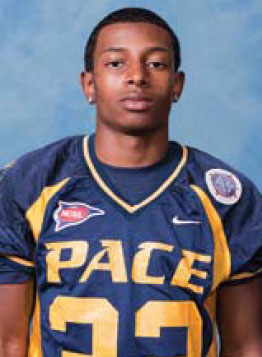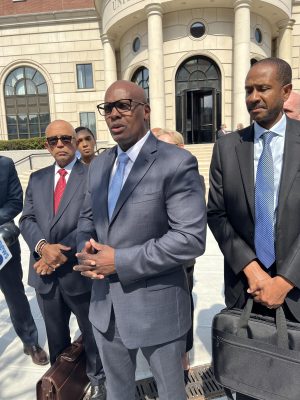New Grand Juries Won’t Be Convened in Henry, Chamberlain Shootings

No legal basis was found to convene new grand juries into the police shooting deaths of Pace University student Danroy (DJ) Henry and White Plains resident and former Marine Kenneth Chamberlain Sr., an independent review concluded.
Westchester County District Attorney Mimi Rocah made the announcement Wednesday morning more than two years after the inquiries were launched. However, Rocah highlighted how there could have been different outcomes had certain measures been in place.
Rocah said under New York State law the threshold to resubmit charges to a grand jury is substantial. Courts look for new evidence or whether the grand jury failed to give the case a complete and impartial investigation or if there’s a basis for believing the grand jury acted in an irregular manner, she said.
“Here, the independent review found there was no new evidence, as described above, and found no other basis to seek court authorization to resubmit charges to a new grand jury,” the conclusions of the independent review stated.
Henry, 20, of Easton, Mass., and a member of the Pace University football team, was killed on Oct. 17, 2010, when then-Pleasantville Police Officer Aaron Hess shot him through the windshield of the car he was driving after he was asked by a Mount Pleasant officer to move the vehicle out of a fire lane at the Thornwood Town Center.
Chamberlain, 68, who suffered from mental illness, was shot and killed in his home on Nov. 19, 2011, following a confrontation with White Plains police after they responded to an accidental activation of his medical alert system.
Civil litigation was initiated stemming from both incidents. The Henry family reached a $6 million settlement with the Village of Pleasantville in 2016. The Chamberlain family is still in court against the City of White Plains.
Both investigations were requested by the Henry and Chamberlain families. They were conducted by John Gleeson, a retired U.S. District Court judge, and Douglas Zolkind, a former federal prosecutor, currently partners at the law firm of Debevoise & Plimpton LLP in New York City.
In a prepared statement Wednesday morning, Rocah said analysis and reforms “are desperately needed” on how police are trained and handle certain situations and how families of shooting victims are treated.
“We are sharing our findings and recommendations in the hopes that we can improve the process in police-involved shooting cases to be more transparent, fair and compassionate to grieving families,” Rocah said in the statement. “When those of us in the criminal justice system acknowledge where we can do better, the increased transparency leads to more faith and trust in the system. More critically, it allows for prosecutors and law enforcement alike to take steps to ensure that tragedies like these are not repeated.”
A message left for Pleasantville Police Chief Erik Grutzner was not immediately returned.
Reached Wednesday afternoon, Henry’s parents Angella and Danroy Sr., said they were disappointed in the outcome but plan to concentrate on helping other children through the DJ Dream Fund, a foundation established in their son’s memory, and work toward making legislative changes.
“We’re never going to win in this game either way,” Danroy Henry Sr. said. “We’re never going to get our son back. We appreciate (Rocah’s) efforts and the efforts of Judge Gleeson and wish there was a different outcome. We wish that Aaron Hess was held more accountable than it looks like he will be.”

Although New York law makes it difficult to launch, the Henrys were pleased that portions of the findings and the proposed recommendations from Rocah strongly imply that the police actions and investigation was flawed, but the independent review was done “certainly more fairly and properly than what was done under (former District Attorney) Janet DiFiore’s watch.”
Danroy Henry Sr. said DiFiore and others should not be let off the hook.
“That was partial and biased from the outset,” he said. “I’m not sure, frankly, that the D.A.’s office now disagrees with that view. “In fact, I think her statement makes it clear that she found areas where they should have done things differently.”
In the Henry investigation, Rocah recommended all police departments in the county have enhanced training on how to handle situations involving a moving vehicle, prioritizing officer and civilian safety; that an assessment is completed in police-involved shootings to determine what could have been done differently once the grand jury process is finished; and effective protocols where more than one police agency is involved, particularly in chaotic scenes. That is especially important in Westchester because there are 42 different police agencies in the county, the findings noted.
In both the Henry and Chamberlain matters, Rocah recommended that all investigations into police-involved shootings are done by an independent party; that the district attorney’s office will strongly consider exercising discretion in whether it prosecutes low-level charges for witnesses of a police-involved shooting incident so relevant testimony is not hindered or prevented; to reinforce a practice to consider and submit all viable charges to the grand jury where there are competing, yet equally plausible, interpretations of events; and for law enforcement to refrain from issuing broad and vague statements, which can be misleading and cause confusion.
Furthermore, the district attorney’s office should strongly consider moving to unseal the charges submitted to the grand jury, as was done in the investigation of the Kamal Flowers shooting death in New Rochelle in 2020.
The findings also cited how the families of both men lacked confidence in the investigation and grand jury process. It stated that compounding the trauma and pain for the Henry family was the then-Mount Pleasant police chief incorrectly stating the day after his death that DJ Henry struck one officer, was driving toward a second officer and that both officers discharged their firearms at the vehicle to stop it. Seven years later, in May 2017, the Town of Mount Pleasant issued a public statement retracting those assertions.
“It is important to announce these failings because these are not purely historical issues,” Rocah stated. “Especially in police use-of-force cases, police and prosecutors should be extremely cautious in issuing statements reaching conclusions on key disputed questions until after an official investigation is complete.”
“I think they took that statement that was issued that morning and made that a fact pattern they’d pursue,” Danroy Henry Sr. added.
Regarding the Chamberlain incident, Rocah recommended that all police departments enhance training and protocols in de-escalating situations where a person has significant mental health issues. While she acknowledged that the county introduced mobile crisis teams last year where a mental health professional accompanies police in those emergencies, it is not clear whether all agencies take advantage of it.
“However, further measures are needed to ensure all 42 police departments are actually utilizing this County service,” the recommendation stated.
Rocah also called on local lawmakers to propose legislation that requires specific training and procedures across Westchester. One possibility is employing the Integrating Communications, Assessment and Tactics training program that is geared toward dealing with individuals suffering from mental illness who exhibit signs of threatening behavior and may be armed with a weapon that is not a firearm.
She raised questions whether Chamberlain’s death could have been avoided if police had better protocols or more effective implementation of existing protocols and training related to handling someone with a mental health crisis. The district attorney also questioned whether responding officers adequately attempted to de-escalate the situation and if the department was “sufficiently transparent about the inexcusable use of a racial slur by a WPPD officer toward Mr. Chamberlain, who is Black, during the long standoff preceding his death.”

Martin has more than 30 years experience covering local news in Westchester and Putnam counties, including a frequent focus on zoning and planning issues. He has been editor-in-chief of The Examiner since its inception in 2007. Read more from Martin’s editor-author bio here. Read Martin’s archived work here: https://www.theexaminernews.com/author/martin-wilbur2007/
